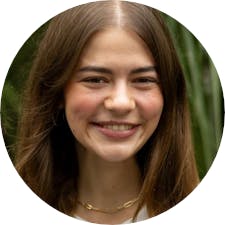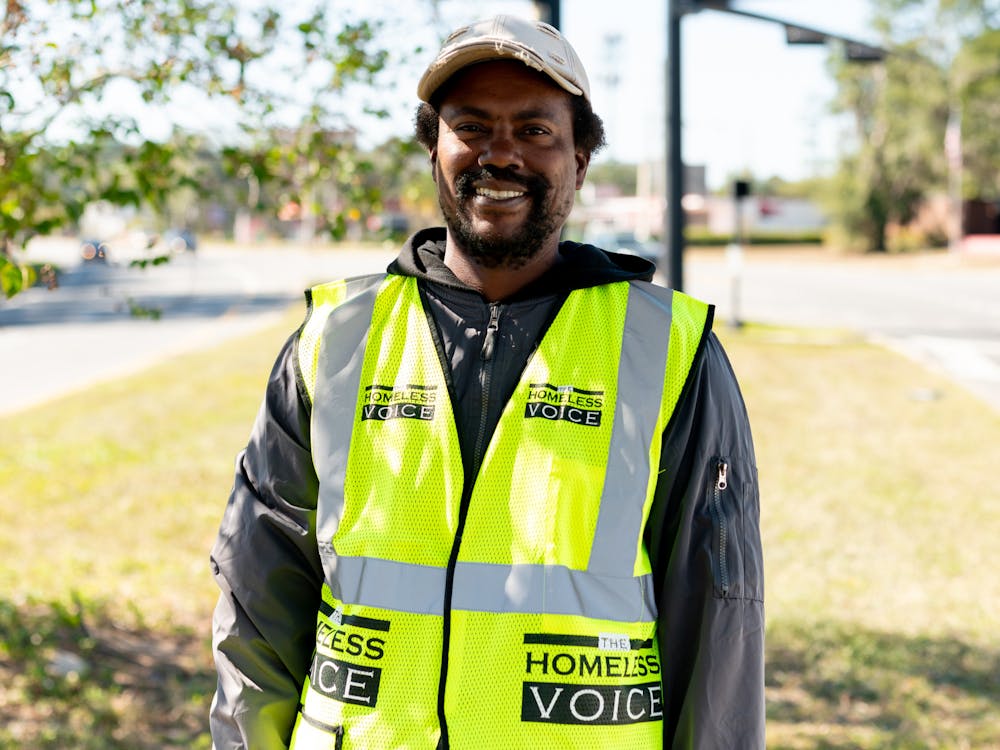Gregory Hanna wandered back and forth on the narrow median strip dividing Southwest Archer Road. Dressed in a neon T-shirt and matching bucket hat, he clutched a folded piece of paper as traffic roared by on either side of the intersection.
The 66-year-old Lake City resident has spent the last 13 years selling newspapers for Homeless Voice, a 16-page paper discussing homeless issues. The paper is owned by the COSAC Foundation, a non-profit homeless aid organization, and sold in the streets by clients of COSAC’s shelters.
Every day, COSAC shelter residents are driven to one of several major Florida cities — including Tallahassee, Orlando and Tampa. From 7:30 a.m. to 3 p.m., the vendors stand at major intersections offering newspapers to drivers in exchange for donations. About 75% of profits go to the vendors, while the remaining 25% is put back into the shelter and paper.
Gainesville was the most recent addition to Homeless Voice’s roster. COSAC began sending vendors to the city about five months ago when they were left with no choice but to do so, said Homeless Voice publisher and COSAC board member Sean Cononie.
“Duval County and Columbia County made it illegal, and Gainesville had a more liberal policy, so we decided to go to Gainesville,” he said.
Moving from Duval County to Gainesville took a chunk out of Homeless Voice’s profits, Cononie said. The paper was doing well in Duval, but is only making one-third as much revenue in Gainesville, he said.
Homeless Voice newspaper
Homeless Voice, the only street newspaper in Florida today, was founded with the goal of funding COSAC shelters in 1999.
Andrew Fraieli, the paper’s editor-in-chief for the last five years, edits about seven articles for each quarterly printed paper. His writers are a mix of journalists interested in covering homeless issues and homeless individuals who want to share their experiences, he said.
Mary Stewart, a West Palm Beach resident, wrote five articles for the October print. Stewart has gone in and out of homelessness and writes on issues like lack of mental healthcare and cold-weather protection for the unhoused.
Stewart has written for the paper for about two years. She writes often and well, despite transportation and technology barriers, Fraieli said.
“I think she's writing on her phone from what she's sending me,” Fraieli said. “The main issue is that she's had her phone stolen. And with that goes her passwords and logins for her banking information, so it becomes difficult to even pay her.”
Fraieli also writes his own articles for the paper — mostly long-term projects that he writes over the course of a few months, like an April 2022 investigative piece on homeless hate crime laws in Florida that won a Green Eyeshade Award in 2023.
Since he moved from Florida to Denver a year and a half ago, many of Fraieli’s writers have been journalists he’s met in Colorado who write about Florida homelessness based on research rather than experience.
Mckenna Harford, a reporter for Colorado Community Media, wrote a piece for Homeless Voice’s October edition. The 28-year-old Denver resident accepted Fraieli’s offer to write freelance for the paper because of her lifelong interest in housing issues, she said.
Harford was forced to find a new job and move out of her community when the newspaper she wrote for changed ownership and no longer offered subsidized housing, she said. The experience made her realize people are much closer to being unhoused than they know, she said.
Though the details of affordable housing issues are different in Florida and Colorado, the causes are similar, and she’s found it interesting to compare the two states while researching for Homeless Voice, she said.
“I hope that the more people talking about it, regardless of what state they’re from, the more likely that we’ll have better solutions and have more eyes and hopefully funds,” she said.
Homelessness in Gainesville
Gainesville residents are familiar with homeless issues. In 2021, Gainesville’s homeless count of 189 per 100,000 residents was almost double that of the state average of 96, according to the Florida Department of Health. The city rate has outpaced the statewide one for over a decade.
COSAC sometimes takes people from Gainesville to live in its Lake City shelter, Cononie said.
As Gainesville is home to a university with almost a 35,000 undergraduate student population, concerns about safety due to a large homeless population have long been raised by students and families.
“I live off-campus and just on that walk I usually see one or two homeless people, so it’s definitely something that is visible,” said Annika Thiim, a 20-year-old UF psychology junior. “I haven’t had any encounters that have made me fearful, but definitely I do take precautions.”
As an out-of-state student from California, Thiim noticed a more prevalent homeless population in Florida than her hometown immediately after arriving, she said. She wonders if the cluster of new apartments being built close to campus has contributed to people being displaced, she said.
Though homeless advocacy groups like GRACE Marketplace — where Thiim volunteers with her a capella group — are willing to go out of their way to help unhoused individuals, Thiim feels the city has room for improvement in its management of affordable housing issues, she said.
Fraieli hopes by vending in college towns like Gainesville, he can encourage people to actually listen to homeless people, rather than listen to public opinions about them. Most of the time, these people aren’t causing any problems, he said.
“If you’re seeing these people sleeping on the side of the street and feel scared or unsafe around them, just imagine how they feel,” Fraieli said. “They have to sleep out in the open, where it’s very easy for a crime to be committed against them and for there to be absolutely zero repercussions.”
Hanna lives in COSAC’s Lake City shelter and is spending every day vending in Gainesville right now, he said. The newspapers he sells educate people on homelessness, he said.
“We can live, but it’s not easy, and we have to pay for it,” he said. “People are mean sometimes … but I’ve been doing it for 13 years, so I’m used to it.”
COSAC Foundation
Both praise and controversy have followed the COSAC Foundation since its founding in May 1997. Sean Cononie opened the shelter almost overnight after he was injured at age 19 and left with “a lot of money” from the incident, he said.
COSAC ran a 22-room hotel in Hollywood for 13 years that housed more than 200 homeless men and women per night. In 2015, the city of Hollywood paid Cononie almost $5 million to close the shelter, with the caveat that Cononie could not return to live in Hollywood for 30 years.
“They wanted to redevelop a federal highway, and we didn’t fit the criteria,” Cononie said. “They were denying EMS to enter the building, they wanted us gone so bad.”
COSAC moved to Polk County, where it ran a shelter for three years before Polk County decided it didn’t want a homeless shelter in its city, Cononie said.
Now, COSAC is based in Lake City, where it operates a veteran’s motel and a transitional housing center. The foundation also has a drive-thru food bank in Polk County, a medical outreach team in South Florida and small shelters in Broward County, Cononie said.
In 2021, COSAC took in $725,989 in total revenue — 39.2% of which came from contributions and grants that represent a lump sum of Homeless Voice sales and other donations. The paper is the opposite of a traditional newspaper in its operations, Cononie said.
“Newspapers make money on advertisements,” he said. “We make money on circulation.”
Homeless Voice sales are low currently, Cononie said. Duval and Lake County won’t let COSAC vend at all, and Gainesville’s municipality codes — while the most liberal in the area — still make it difficult to sell papers, he said.
The foundation earns about $200 per day from Gainesville vendors and close to $400 across all its cities, Cononie said.
The COSAC foundation saw a drop in newspaper revenue of over 42% in 2021. Expenses outpaced revenue by over $300,000, leaving COSAC with a drop in net assets of 58% compared to the previous year.
COSAC has long faced criticism for requiring a program fee from residents who stay at its shelters to help cover costs, but Cononie argues everybody charges a fee. No one questions that the Salvation Army has charged a fee for 70 years, he said.
The only people raising concerns are politicians and people who want to go from place to place sleeping in free beds, he said.
“If you just gave anybody a bed, no one would work, so we would have to have 20,000 beds,” he said. “Anybody with common sense would understand that.”
COSAC Foundation has faced no problems with city government in Lake City thus far, said Cononie. He has no plans to add more locations to the Homeless Voice circulation but hopes to spread the organization’s medical outreach throughout the state.
Contact Zoey Thomas at zthomas@alligator.org. Follow her on Twitter @zoeythomas39.

Zoey is the Fall 2025 engagement managing editor of The Alligator. She has previously served as data editor and reported on the university, metro and enterprise desks. Over the summer, she interned for the Orlando Sentinel. Zoey inherited her mom's love of strong coffee and her dad's love of "Buffy the Vampire Slayer."






